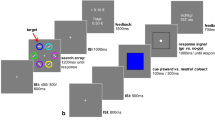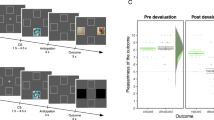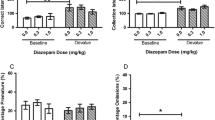Abstract
Low doses of amphetamine were found to alter the ability of marmosets to take account of changes in reward values of object stimuli in a visual discrimination task. Under amphetamine, animals changed their motor responses and stimulus choice in order to preserve the acquired reward value or meaning of certain stimuli. These results suggest that the perseverative effect of amphetamine on behaviour is due to impaired cognitive flexibility rather than to an enhancement of motor habit.
Similar content being viewed by others
References
Beninger RJ, Hanson DR, Phillips AG (1980) The effects of pipradrol on the acquisition of responding with conditioned reinforcement: a role for sensory preconditioning. Psychopharmacology 69:235–242
Connell PH (1958) Amphetamine psychosis. Maudsley Monograph No. 5. Chapman and Hall, London
Ellinwood EH (1971) “Accidental conditioning” with chronic methamphetamine intoxication: implications for the theory of drug habituation. Psychopharmacologia 21:131–138
Gellermann LW (1933) Chance orders of alternating stimuli in visual discrimination experiments. J Genet Psychol 42:206–208
Harlow HF (1958) Behavioural contributions to interdisciplinary research. In: Harlow HF, Woolsey CN (eds) Biological and biochemical bases of behaviour. University of Wisconsin Press, Madison, pp 3–23
Hill RT (1970) Facilitation of conditioned reinforcement as a mechanism of psychomotor stimulation. In: Costa E, Garattini S (eds) Amphetamine and related compounds. Raven Press, New York, pp 781–795
Hinde RA (1970) Development of stimulus-response relations. In: Animal behaviour. McGraw-Hill, New York, pp 500–527
Janowsky DS, Risch C (1979) Amphetamine psychosis and psychotic symptoms. Psychopharmcology 65:73–77
Ridley RM, Baker HF, Weight ML (1980a) Amphetamine disrupts successive but not simultaneous visual discrimination in the monkey. Psychopharmacology 67:241–244
Ridley RM, Haystead TAJ, Baker HF (1981a) An involvement of dopamine in higher order choice mechanisms in the monkey. Psychopharmacology 72:173–177
Ridley RM, Haystead TAJ, Baker HF (1981b) An analysis of visual object reversal learning in the marmoset after amphetamine and haloperidol. Pharmacol Biochem Behav 14:345–351
Ridley RM, Haystead TAJ, Baker HF, Crow TJ (1981c) A new approach to the role of noradrenaline in learning: problem-solving in the marmoset after α-noradrenergic receptor blockade. Pharmacol Biochem Behav 14:849–855
Ridley RM, Weight ML, Haystead TAJ, Baker HF (1980b) “Go here-Go there” Performance after amphetamine: the importance of the response requirement in successive discrimination. Psychopharmacology 69:271–273
Robbins TW (1976) Relationship between reward-enhancing and sterotypical effects of psychomotor stimulant drugs. Nature 264:57–59
Robbins TW (1978) The acquisition of responding with conditioned reinforcement: effects of pipradol, methylphenidate, d-amphetamine and nomifensine. Psychopharmacology 58:79–87
Schnierla TC (1965) Aspects of stimulation and organisation in approach/ withdrawal processes underlying behavioural development. In: Lehrman DS, Hinde RA, Shaw E (eds) Advances in the study of behaviour, Vol I. Academic Press, New York, pp 1–74
Stein L (1964) Amphetamine and neural reward mechanisms. In: Steinberg H (ed) Animal behavior and drug action. Little, Brown, Boston, pp 91–113
Weiss B, Laties VG (1971) Reconciling the effects of amphetamine on human and animal behaviour. In: de Baker SD (ed) The correlation of adverse effects in man with observations in animals. Excerpta Medica Int Cong Series 220, Amsterdam, pp 32–36
Author information
Authors and Affiliations
Rights and permissions
About this article
Cite this article
Ridley, R.M., Baker, H.F. & Haystead, T.A.J. Perseverative behaviour after amphetamine; dissociation of response tendency from reward association. Psychopharmacology 75, 283–286 (1981). https://doi.org/10.1007/BF00432439
Received:
Accepted:
Issue Date:
DOI: https://doi.org/10.1007/BF00432439




